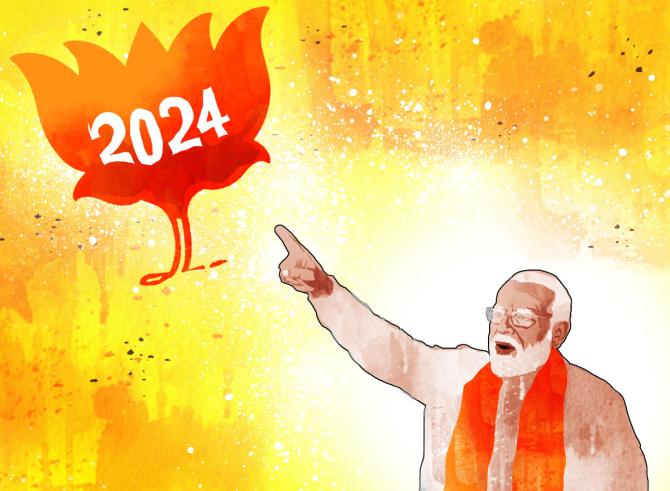'If the majority falls short of expectations, it may prompt initial adjustments in investor sentiment.'

With less than three weeks remaining until the declaration of results for the 18th Lok Sabha elections, the markets are witnessing a spike in volatility.
While the victory for the incumbent Bharatiya Janata Party government has largely been factored into market expectations, the uncertainty surrounding the allocation of seats is stirring some apprehension among investors.
Niket Shah, the newly appointed chief investment officer at Motilal Oswal Mutual Fund, suggests that if the ruling coalition fails to secure a substantial majority, it could exacerbate short-term market volatility.
Shah, who oversees assets valued at Rs 46,000 crore (Rs 460 billion), shares with Abhishek Kumar/Business Standard via e-mail that valuations remain reasonable, and the potential for higher earnings growth is bolstering the ascent of small and midcap stocks.
Some analysts suggest that the general election result may deviate from expectations. Do you perceive this as a risk for the equity market?
A significant majority secured by the current ruling coalition could be viewed positively by the market, potentially boosting investor confidence.
Conversely, if the majority falls short of expectations, it may prompt initial adjustments in investor sentiment.
However, it's unlikely that the outcome of the election will have a major long-term effect on the equity markets.
Should the ruling coalition fail to secure a substantial majority or witness a change in the central government, it could lead to increased market volatility in the short term.
Nevertheless, such developments may not fundamentally alter long-term market dynamics.
Given the elevated valuations along with geopolitical and election risks, should investors adjust their equity allocation?
The Nifty 50 is presently trading at 18 times its forward earnings, closely aligned with its long-term average.
However, small and midcaps are trading at a higher multiple of 25 times forward earnings, driven by growth trends.
As long as earnings growth remains strong, these elevated multiples are likely to persist.
Regarding geopolitical factors, historical patterns indicate that short-term impacts tend to revert to their mean over time, as seen in past crises such as the Russia-Ukraine conflict.
Similarly, events involving Israel and Iran are unlikely to deviate from this trend.
Investors are advised to maintain a long-term perspective and focus on the country's broader growth prospects.
Are results from small and midcap firms justifying their valuations?
The valuations of small and midcaps are justified by their remarkable earnings growth, exceeding 40 per cent, which is the highest observed in decades.
A rerating was foreseeable due to the higher growth multiples. It's worth noting that between 2010 and 2020, small and midcap indices recorded only 4 to 5 per cent earnings growth.
How do you assess Q4 results that have been released so far? Has any sector presented any surprises?
It's early to draw comprehensive conclusions from the Q4 results.
Among the key firms that have reported earnings, there has been notable profit-after-tax growth of 9 per cent, surpassing the expected range of 7 to 8 per cent.
Considering that a major portion of the overall earnings reports are yet to be released, it would be premature to make definitive assessments.
At the fund house level, Motilal Oswal has an appreciably lower allocation in banks. Do you foresee further downside in larger private banks?
We believe that banks have had a dream run over the past three years.
This momentum has been driven by the RBI's repo rate adjustments, promptly reflected in yields, thereby benefiting net interest margins (NIMs) and improving the cost-to-income ratio due to the numerator-denominator effect.
Credit costs during the same period have come off, contributing to robust PAT growth and stock price returns.
We expect the cost of funds to rise in the upcoming period, placing pressure on NIMs.
We envisage that the RBI rate cut could result in lower yields, further impacting NIMs.
We envision credit costs gradually normalising from their multi-year lows, leading to lower PAT growth over the next 12-18 months as this cycle unfolds.

Disclaimer: This article is meant for information purposes only. This article and information do not constitute a distribution, an endorsement, an investment advice, an offer to buy or sell or the solicitation of an offer to buy or sell any securities/schemes or any other financial products/investment products mentioned in this article to influence the opinion or behaviour of the investors/recipients.
Any use of the information/any investment and investment related decisions of the investors/recipients are at their sole discretion and risk. Any advice herein is made on a general basis and does not take into account the specific investment objectives of the specific person or group of persons. Opinions expressed herein are subject to change without notice.
Feature Presentation: Aslam Hunani/Rediff.com












 © 2025
© 2025